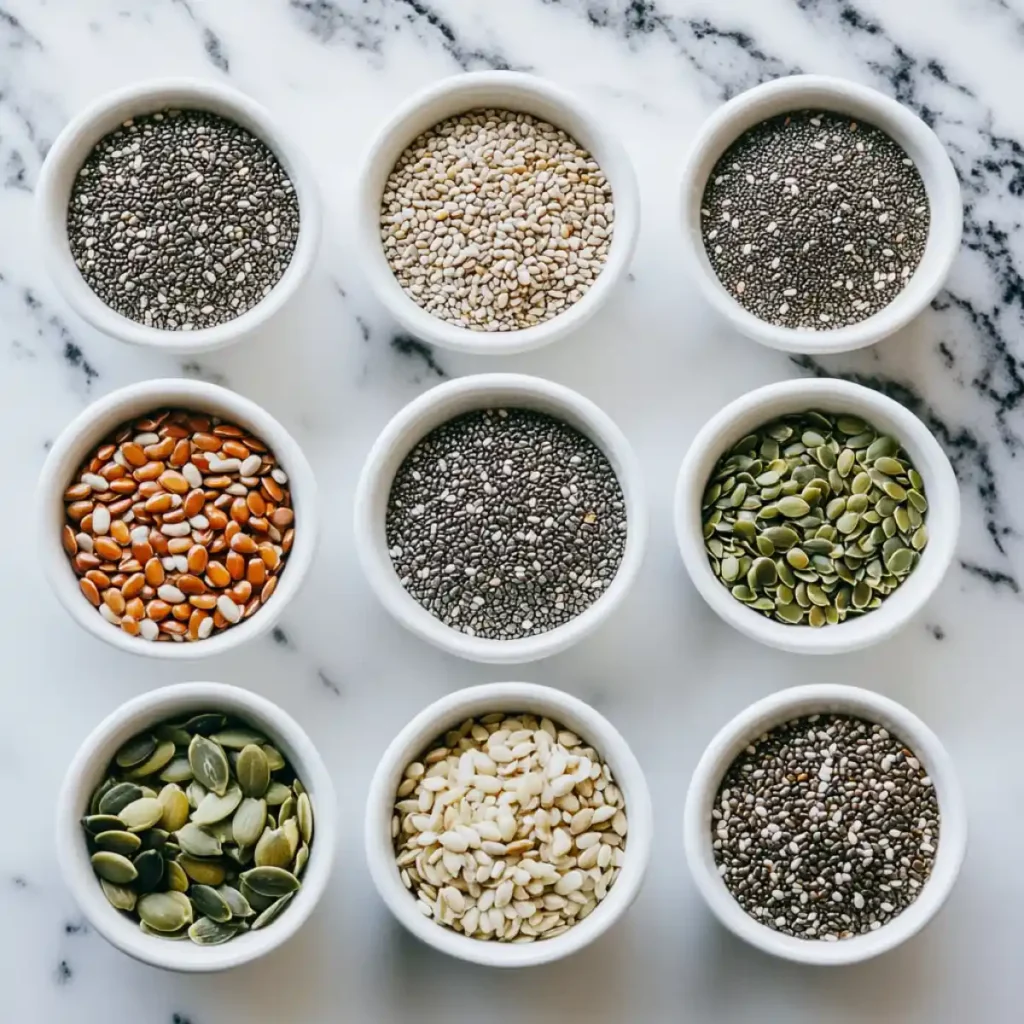Struggling to find bariatric-friendly foods that are easy to digest yet packed with nutrients? As a self-taught chef with a love for simple, wholesome ingredients, I’ve spent years perfecting recipes that nourish without compromise—especially after my Creole grandma taught me the power of seeds. Whether you’re post-surgery or just seeking gut-friendly meals, seeds like pumpkin, chia, and flax are digestion heroes. They’re tiny but mighty, offering protein, fiber, and healthy fats in perfectly portioned bites.
But not all seeds are created equal—some need soaking, others blend best in recipes, and a few should be avoided altogether. That’s why I’m sharing my top bariatric seed tricks, including my favorite ritual recipe (hint: it involves thyme from my garden and a knock on the oven for luck!). Let’s dig in!

Table of Contents
Table of Contents
Top 4 Seeds to Use
If you’re exploring bariatric-friendly foods, seeds should be at the top of your list—they’re tiny but pack a serious nutritional punch. After my own kitchen experiments (and a few fails involving my cat Miso stealing pumpkin seeds), I’ve narrowed it down to the four best seeds for post-surgery diets. These little powerhouses are easy to digest, loaded with protein and fiber, and perfect for portion control. Let’s cut to the chase:
1. Pumpkin Seeds (Pepitas)
A bariatric seed trick I swear by? Roasted pumpkin seeds. Just 1 ounce (about ¼ cup) gives you 7g of protein and a hefty dose of magnesium—key for muscle recovery. I toss mine with a pinch of smoked paprika (thanks to my Creole roots) and roast at 300°F for 15 minutes. Pro tip: Buy them pre-shelled to avoid texture issues post-op.
2. Chia Seeds
Ever tried the bariatric seed ritual of overnight chia pudding? Mix 2 tablespoons of chia seeds with ½ cup almond milk, let it sit overnight, and boom—a gut-friendly breakfast. They expand in liquid, which helps with fullness, and deliver 5g of fiber per serving. My 6-year-old, Sophie, calls it “frog eggs,” but trust me, it’s a lifesaver.
3. Flaxseeds
Ground flaxseeds are a must for smooth digestion. I add 1 tablespoon to my morning smoothies or yogurt for a nutty boost. They’re rich in omega-3s, which help reduce inflammation—something my grandma drilled into me early. Just avoid whole flaxseeds; they’re harder to digest.
4. Sunflower Seeds
A great low-cost option, sunflower seeds offer 6g of protein per ¼ cup. I blend them into my bariatric seed recipe for “cheesy” sauces (nutritional yeast + seeds = magic). But here’s the hack: Opt for unsalted to avoid bloating.
After trying countless diets, I finally found balance with these natural weight loss recipes.
Nutritional Breakdown
Now, let’s geek out on the numbers. Why are these seeds bariatric superstars?
Protein Power
Post-surgery, protein is your best friend. Pumpkin and sunflower seeds lead the pack, with 7g and 6g per ounce, respectively. Compare that to almonds (6g), and seeds win for easier digestion.
Fiber Fix
Chia and flaxseeds are fiber kings—5g and 3g per serving—helping prevent constipation (a common post-op struggle). My mom-tip? Soak chia seeds first to avoid discomfort.
Healthy Fats & Micronutrients
- Pumpkin seeds: High in zinc (immunity boost) and magnesium (muscle relaxant).
- Flaxseeds: Omega-3s for heart health.
- Sunflower seeds: Vitamin E for skin healing.
Portion Control
Seeds are calorie-dense, so stick to 1–2 tablespoons per meal. My favorite bariatric seed trick? Pre-portion snack bags with ¼ cup servings to avoid overdoing it.
There you have it—the top seeds to fuel your recovery without the guesswork. Up next, we’ll tackle which seeds to avoid and the soaking vs. raw debate. (Spoiler: My cat Kiwi once stole a raw sunflower seed and gave me a very judging look.)
Are All Seeds Safe After Surgery?
Let’s get real—not all seeds are bariatric-friendly, especially right after surgery. I learned this the hard way when my overenthusiastic love for sesame seeds led to a very uncomfortable evening (lesson: chew thoroughly!). Here’s the lowdown on which seeds to embrace and which to avoid during recovery:
Seeds to Avoid Early On
- Whole Flaxseeds & Chia Seeds (Unsoaked)
- These tiny guys can swell in your stomach, causing blockages if not soaked first. Stick to ground flaxseeds and pre-soaked chia (more on that later).
- Hard, Large Seeds (Like Watermelon or Apple Seeds)
- Their tough shells are tough to digest. Pro tip: If my cat Miso won’t eat it, neither should you post-op.
- Seeds with Hulls (Sunflower Seeds, Unshelled Pumpkin Seeds)
- The fibrous hulls can irritate your healing stomach. Opt for hulled versions or grind them into butter.
Safe Seeds (With Prep Tips)
- Pumpkin Seeds (Shelled): Roast at 300°F for 15 mins with a dash of salt—crunchy and easy to digest.
- Ground Flaxseeds: Add 1 tbsp to smoothies or yogurt for a fiber boost.
- Soaked Chia Seeds: Mix 2 tbsp with ½ cup liquid (almond milk, broth) and wait 10+ mins.
Fun fact: My Creole grandma swore by pumpkin seed tea for digestion—but we’ll save that bariatric seed tea recipe for another day!
Soaking vs. Raw: What Works Best
Here’s the deal: Soaking isn’t just hippie nonsense—it’s a game-changer for bariatric patients. Let’s break it down:
Why Soak?
- Easier Digestion: Soaking softens seeds, reducing irritation. (Trust me, your stomach will thank you.)
- Nutrient Boost: It activates enzymes, making nutrients like iron and zinc more absorbable.
- Texture Fix: No one wants chia seeds stuck in their teeth mid-meal.
How to Soak Like a Pro
- Chia Seeds:
- Ratio: 1 tbsp chia + 3 tbsp water or almond milk.
- Time: 10 mins (for pudding) or overnight.
- Hack: Add cinnamon to mimic my “bariatric seed ritual” breakfast.
- Flaxseeds:
- Skip soaking—just grind them! Store in the fridge for up to 2 weeks.
- Pumpkin Seeds:
- Soak in salted water for 6+ hours, then roast for maximum digestibility.
When Raw Works
- Post-Recovery Phase: Once healed, raw sunflower seeds (in moderation) make a great snack.
- Ground Seeds: Already broken down, so no soaking needed.
Pro tip: My kid Sophie once tried to “soak” seeds in her juice box. Stick to water, folks.
Up next? My favorite gut-healing seed combo—aka the bariatric seed trick that saved my sanity during recovery. (Spoiler: It involves my grandma’s cast-iron skillet and a knock on the oven door for luck.)
My Favorite Gut-Friendly Seed Combo
After months of tweaking ratios and taste-testing (with my six-year-old Sophie as the world’s pickiest critic), I landed on what I now call my signature bariatric seed ritual—a perfectly balanced breakfast that’s become my family’s go-to. Here’s why this combo works so well for post-bariatric needs:
The Seed Power Players
Each ingredient in this bariatric seed trick recipe serves a specific purpose:
- Chia seeds (2 tbsp) create the perfect pudding-like base
- Ground flaxseeds (1 tbsp) add buttery omega-3s
- Pumpkin seeds (1 tbsp) give that satisfying crunch
- Hemp hearts (1 tbsp) boost plant-based protein
The magic happens when these combine with almond milk and a few flavor boosters (my Creole grandma’s vanilla trick is chef’s kiss). For the exact measurements and step-by-step photos (including Sophie’s “sprinkle technique”), check out my full Bariatric Seed Ritual Recipe.
Final Tips
Before you start your seed journey, keep these pro tips in mind:
1. Texture is Everything
- Always grind flaxseeds (whole ones just pass through undigested)
- Soak chia for at least 4 hours for that perfect gel-like consistency
2. Flavor Twists
- Swap cinnamon for cocoa powder when you need a chocolate fix
- Try thyme-infused honey for an herbal note (my garden special!)
3. Portion Control
Stick to 1/4 cup servings—seeds are nutrient-dense but calorie-packed. I prep single servings in mason jars to avoid overeating.
For more creative ways to use seeds (including my famous bariatric seed tea recipe), visit the full tutorial. Trust me, your gut—and your taste buds—will thank you!
